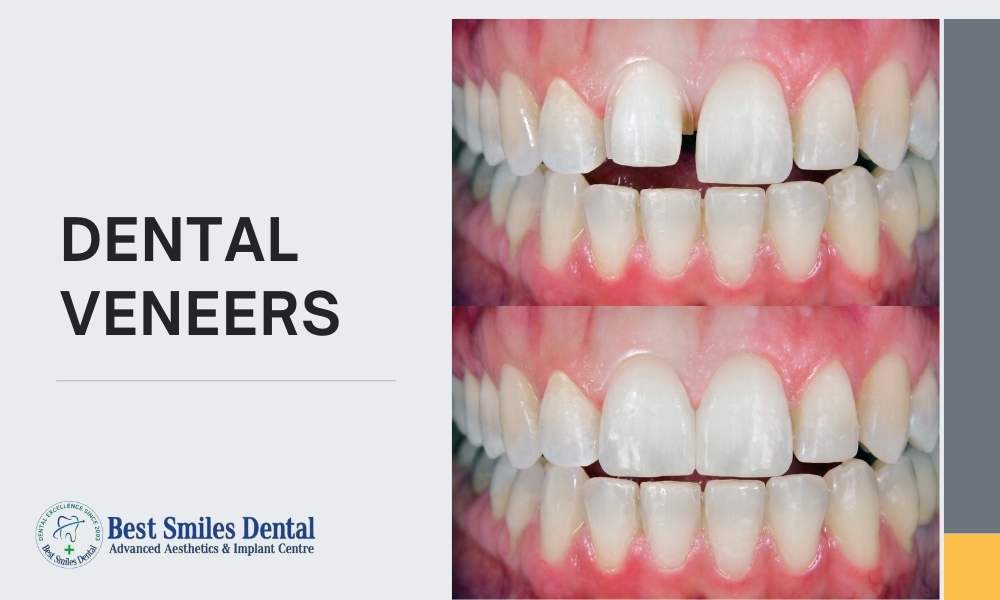Need Appointment ?
Dental Veneers
Dental veneers (sometimes called porcelain veneers or dental porcelain laminates) are wafer-thin, custom-made shells of tooth-colored materials designed to cover the front surface of teeth to change your look or appearance. These shells are bonded to the front of teeth, changing their color, shape, size, or length.
Book Appointment to find out which treatment might be best for you at Best Smiles Advanced Dental Clinic.
What are the types of dental veneers?
- Porcelain veneers: Durable, stain-resistant, and natural-looking.
- Composite resin veneers: More affordable but may stain over time and have a shorter lifespan.

Who gets Dental Veneers?
First, you will talk to your dentist at Best Smiles Advanced Dental Clinic about the result you want. During this appointment, your dentist will look at your teeth to make sure dental veneers are right for you. You’ll discuss the procedure and some of its limits. They may take X-rays and possibly make impressions of your mouth and teeth.
1. Preparation : To get a tooth ready for a dental veneer, your dentist will reshape the tooth surface. They’ll take off an amount roughly equal to the thickness of the veneer that will be added to the tooth surface. You and your dentist will decide whether they numb the area before trimming off the enamel.
2. Bonding : Your dentist will place the veneer on your tooth to check its fit and color. They’ll remove and trim the veneer – probably a few times – to get the proper fit before they cement it to your tooth. Next, to prepare your tooth to receive the veneer, it will be cleaned, polished, and etched. Etching roughens the tooth to allow for a strong bonding process. A special cement is applied to the veneer, and it is then placed on your tooth.
Dental Veneers are often used on teeth that:
- Are discolored because of:
- Root canal treatment
- Stains from tetracycline or other drugs
- Excessive fluoride
- Large resin fillings
- Other causes
- Are worn down
- Are chipped or broken
- Are crooked, uneven, or oddly shaped (for example, have craters or bulges in them)
- Have gaps between them (to close the space)
Dental Veneer Procedure
Getting a dental veneer usually requires three trips to the dentist – one for a consultation and two to make and put on the veneers. This can happen on one tooth or many teeth at the same time.
What is the process for getting veneers?
First, you will talk to your dentist at Best Smiles Advanced Dental Clinic about the result you want. During this appointment, your dentist will look at your teeth to make sure dental veneers are right for you. You’ll discuss the procedure and some of its limits. They may take X-rays and possibly make impressions of your mouth and teeth.
The process usually involves these steps:
- Consultation: Discuss your goals and ensure veneers are suitable for you.
- Preparation: A small amount of enamel is removed from the teeth to make space for the veneers.
- Impressions: A mold of your teeth is taken to create the veneers.
- Placement: The veneers are bonded to your teeth with a strong adhesive and adjusted for a perfect fit.
Dental Veneer Benefits
Veneers offer these advantages:
- They look like a natural tooth.
- Gums usually aren’t sensitive to porcelain.
- Porcelain veneers are not easily stained.
- A color can be selected to make darker teeth appear brighter.
- They generally don’t require as much shaping as crowns do, and they are stronger and look better.

Pain-Free Dentistry
Comfortable, stress-free treatments every time.

Next-Gen Equipments
Precision care with advanced technology.

Expert Care Guaranteed
Trusted specialists for superior oral health.
Frequently Asked Questions
Discover everything you need to know about professional tooth cleaning and polishing. Learn how it removes plaque, enhances your smile, and promotes better oral health.
Yes, veneers are designed to mimic the appearance of natural teeth, including their color, texture, and translucence.
While veneers themselves are durable, they are not permanent. Additionally, the enamel removed during the preparation process makes the treatment irreversible.
No, veneers don’t require special care beyond regular oral hygiene practices like brushing, flossing, and routine dental checkups. Avoid biting on hard objects like ice or pens to prevent damage.
Porcelain veneers are highly stain-resistant. Composite veneers can stain over time, so it’s best to avoid foods and drinks that cause discoloration, like coffee, tea, or red wine.
Veneers can improve the appearance of mildly crooked teeth, but they are not a substitute for orthodontic treatments like braces or clear aligners for severe misalignment.
Veneers are not ideal for individuals with severe tooth decay, gum disease, or a habit of grinding their teeth (bruxism) unless these issues are addressed first.

